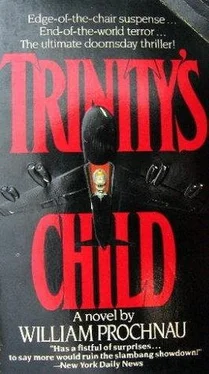The engine roar had become a purr now, its roar their silence. They let the silence sit. Then Kazakhs looked at Moreau, her face moon-framed in its white helmet, the stress lines washed out by the night-light red, the nuked eye appearing natural now.
“Having doubts?” she asked.
“No,” he replied, then checked himself. “Sure I am, Moreau. I was just thinking that our world is dying out there and we haven’t seen a thing, haven’t heard a thing, don’t have the foggiest notion why, and probably never will. Yet we were the killers. We saw a couple of MIG’s, dropped a bomb in the wilderness, had our own little civil war. But even if we had gone, we wouldn’t have been part of the world’s agony. We wouldn’t have seen any more, known any more.”
“We weren’t supposed to, Kazakhs. That’s why people like us could do it.”
“Maybe. I’m not so sure. We humans can be a mean bunch of critters. Give us a creed—any creed—and we’ll shove people with other creeds into ovens. I guess that was our special talent—building bigger and better ovens. Till we finally built one big enough for all of us.”
The purr filled the cockpit again, both of them staring into the mesmerizing maze of their flight panel.
Kazakhs felt awkward and he suddenly switched the radio from private to all stations. “Hokay, mutineers!” he whooped flamboyantly. “Rarotonga! Bora Bora! Hiva Oa! Papeete for the lady! We’re goin’ for the blue lagoon! Sound okay to you, Halupalai?!”
Only a low grunt came from the rear. Moreau turned worriedly toward Kazakhs and asked privately, “Where are we really going?”
Kazakhs shot a worried look back. “I’m not sure.”
She looked at him curiously. “You’re going to fly over Hawaii, aren’t you?”
“It’s a natural navigational pivot point,” Kazakhs answered, much too quickly.
“Pivot point, my ass,” Moreau said quietly.
“We have to see it, Moreau.”
“Him too?” Moreau asked a trifle aggressively as she motioned toward the back.
Kazakhs stared straight ahead. “All of us. We can’t live in some other world without seeing why we have to leave. We’d be nuts in a month. He wouldn’t last a week.” Kazakhs sounded very certain.
“You know what it will look like.”
“Yes.”
They flew on silently for several moments, the engine roar filling their voids.
“He already asked,” Moreau broke the silence.
Kazakhs turned on her abruptly, a strange look in his eyes.
“I said maybe,” she answered defensively. “He was coming apart at the seams. I didn’t want four people stacked downstairs.” She paused. “Maybe five. What were you doing down there?”
Kazakhs allowed a faint smile to cross his face. “Sleepin’,” he drawled.
“You sonuvabitch,” Moreau said. “Kazakhs, you are the most hopeless person I’ve ever met.”
“Yeah,” he acknowledged. “But I may have met my match.”
The persistent rapping startled Harpoon, his mind having drifted so far away. Out of ingrained habit he leaned over in his chair, used the forearm of his starched white shirt to do a quick buff of his spit-polish shine, and then rose quickly. At the door he was greeted by the fat man whom he had pulled aboard with Condor in the chaos of Baton Rouge. The man still sweated profusely, as if he had jogged on this errand, and the turquoise belt buckle was loosened to make more room for his heaving stomach.
“The President would like to see you,” the man wheezed.
“Why, of course,” Harpoon replied, surprised but curious. He reached for the jacket he had draped so neatly over a second chair.
“You won’t need that,” the man said, and Harpoon shrugged, left the coat, and followed him into the hallway. They walked, not quite briskly enough for the admiral, up the spiral staircase and into the presidential quarters. Inside, Condor and the Librarian sat talking intently. The blank-faced Secret Service agent lingered in the background, still cradling his Uzi.
Harpoon drew his shoulders back smartly and snapped a salute. “Sir!” he said.
“Admiral,” the successor acknowledged. He did not invite him to sit down. “We got ourselves a situation here. Need a little more information on our naval forces. Colonel says we got nukes floatin’ all over the place.”
“That’s true, sir. Most of the surface fleet is equipped with both nuclear and conventional weapons. Everything from surface-to-surface missiles to depth charges. You name it. Both fleets, ours and the Soviet.”
“What they doin’ out there now?”
Harpoon’s brow furrowed. “Jockeying, I imagine. I wouldn’t want to be in a surface ship now. They’re just no match for the submarines.”
“What kind of orders they under?”
“General orders. Respond if attacked. Take out any enemy vessels they can find. Especially submarines. They won’t get many. I imagine they’re trying to stay alive to see if the situation settles. If they’ve got any sense, they’ve scattered. We debated that a lot. Navy likes to cluster to protect the carriers. With nukes, that doesn’t work well.”
“And we can’t talk with them?”
“It would be disastrous, sir. They’re sitting ducks. It would bring in the attack subs like sharks.”
“Can they hear us?”
Harpoon was growing confused. “I can’t imagine what we would want to tell them at the moment. They know what happened. Their cut of the pie, their operating space, is very small. Even the carriers.”
“Dammit, Harpoon, just answer the question.” Until now, the successor had not turned to look at the admiral. His head swiveled toward Harpoon, eyes blazing. “Can they hear us?”
Harpoon stared back, perplexed. What the devil was this man up to now? “Some vessels might pick up a satellite patch,” he answered warily. “It would be very hit-and-miss. I doubt they would answer, or even try, unless the situation were one of extremes.”
The successor turned away again. “Okay, enough of that,” he said, quickly dismissing the issue. “Can your friend Alice”—his voice had a ferocious bite on the words, your friend—“issue orders to the submarines?”
Harpoon looked at the colonel, who smiled thinly. What was this all about? The colonel knew most of these answers. “Any command post, including the Looking Glass, could serve as a communications relay,” Harpoon replied. “But the Air Force can’t issue orders to the Navy. Ask for support, offer support, coordinate. But not order.”
“Even if he counterfeited the codes, so it seemed to come from me?”
Counterfeited? Now Harpoon’s heart was racing. Something very big had happened. “I don’t see how he could do that, sir,” the admiral flustered. But Harpoon did see how, with the bogus use of an authenticator card and access to the other codes.
“Seems pretty good at doin’ it with the Air Force,” the successor said venomously.
“My God, sir, what’s going on?”
The successor ignored him. “Navy’s got its own command planes over the Atlantic and Pacific?”
“TACAMO,” Harpoon responded in a whisper.
“They did get airborne?”
“Yes.”
“But we haven’t talked to them.”
“No.”
“Don’t think the Russians shot ’em down?”
Harpoon’s mind was spinning. “Only if they were suicidal. TACAMO’s the best link we have to the submarines. The Soviets know that. They also know that even if the SIOP orders didn’t get through, the subs had a preexisting strike plan. They sail with standard contingency orders. I can’t imagine the Soviets would want the submarines out there without their communications umbilical, firing at will and whim for days, weeks or months after an attack.”
Читать дальше












